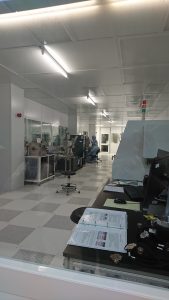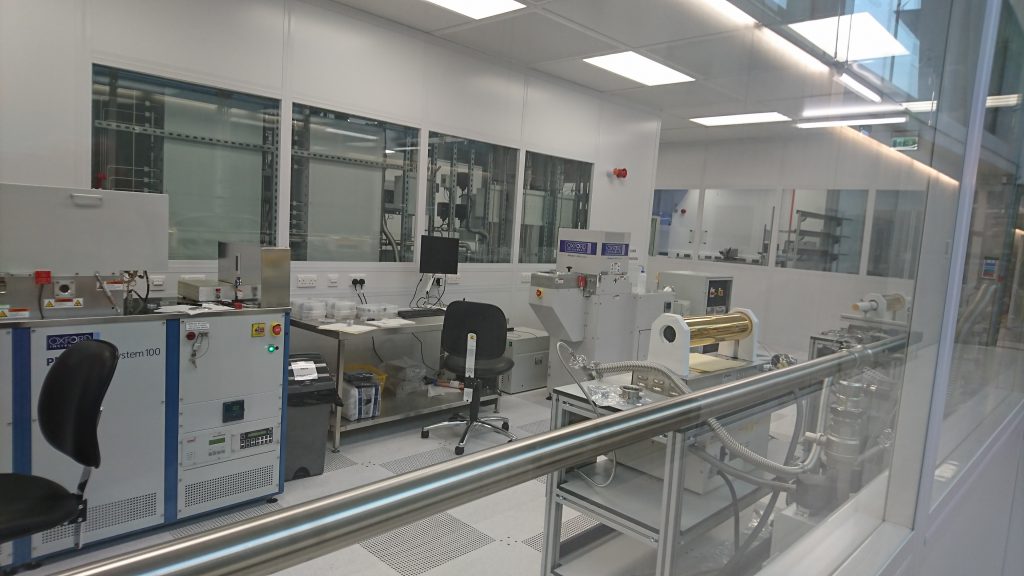Based in Sheffield, the National Centre will tackle the shortage of specialist technical skills in the Higher Education sector. The National Technician Development Centre for Higher Education will provide HE Institutions with access to information, expertise and tools that will enable them to create a sustainable future for their technical staff and services.
The Higher Education Funding Council for England (HEFCE) has awarded funding of £546,000 from its Catalyst Fund to the National Centre, which along with funding from the University of Sheffield and other partners of over £580k, represents a total investment of £1.125 million in the new National Centre.
Professor Sir Keith Burnett, President of the Science Council and the President and Vice- Chancellor of the University of Sheffield, who has been a long-term advocate for technical education through his work with HEaTED and recently the Science Council, said: “Professional Technicians play a vital role in research and education, not only in industry but in the world-leading universities which drive innovation in fields ranging from science and medicine to engineering. Finding a way to nurture and develop this crucial capacity and to support individual professional development matters for individual technicians and the wider community of universities. “I am delighted that this need has been officially recognised by funding being made available to create this National Technician Development Centre, which will be the one stop shop for all universities. The work of the National Centre will make a massive contribution to our understanding of the roles and contribution the Professional Technicians make in the Higher Education sector.”
The work of highly skilled professional technicians can often be overlooked by the Higher Education sector and the challenges of recruitment are widely known. Research by the Gatsby Charitable Foundation suggests that the UK needs 700,000 more technicians by 2020. The expertise of the team at the new National Centre is available to universities across the UK and covers a number of strategic issues around restructuring technical services, business continuity, succession planning, recruitment and other related areas.The work of the National Centre includes the HEI Technical Resources Toolkit, a resource available to aid universities in understanding their technical staff and improving the sustainability of their technical services. The Toolkit and work of the National Centre also enables universities to address and meet the pledges they made to the Science Council’s Technician Commitment, to which nearly half of UK Universities are signatories.
The National Technician Development Centre will continue to work with both partners in HE and related institutions to provide a national framework for standardised job titles, grading and career pathways across the technical workforce. The Centre also examines and signposts to best practice in areas of technical training and development. Yvonne Hawkins, HEFCE’s Director for Universities and Colleges said, ‘We are extremely pleased to support these important developments for higher education and its technical workforce, which builds upon previous investment by HEFCE, the University of Sheffield and partners. Our aim through the funding provided is for the Centre to work on behalf of and for the HE sector, to continue to develop the technical workforce, deliver new ways of working in order to meet future skills needs, and provide a sustainable way forward.’Speaking about the new Centre, Terry Croft, Chairman of the Institute of Science and Technology (IST) and Director of the National Technician Development Centre said: “Official recognition for the new National Centre will galvanise the Higher Education sector to publicise the career opportunities available for technicians in the UK. This will help universities attract and retain the best talent and develop a workforce that is fit for the research challenges ahead.” We look forward to working with all HEIs across the sector to deliver a sustainable future for technical staff and services, which will sustain our internationally recognised teaching and research capabilities well into the 21st century.
Notes
For further information, please contact the National Centre on: 0114 222 9773 or enquiries@nationaltechnicianscentre.ac.uk, 8 Palmerston Road, Sheffield, S10 2TE. Or visit our website at sheffield.ac.uk/tdm. HEFCE’s Catalyst Fund provides targeted investment in activity led by universities and colleges. The fund supports a range of student and sector priorities, including innovation in higher education, efficiency and effectiveness, and student interest issues.
Read a recently published report by Deloitte, on the economic impact of HEFCE’s Catalyst Fund, which found significant benefits for students, the economy and society.
Terry Croft MBE FIScT CSci is the Director of the National Technician Development Centre for Higher Education
He is also the Chair and CEO of the Institute of Science and Technology. www.istonline.org.uk, Director: HEFCE Catalyst Project “Development and Embedding of Career Pathways for Technicians across the Higher Education Sector” www.sheffield.ac.uk/tdm and a Science Council Top 100 Leading Practising Scientist 2014 http://istonline.org.uk/istchairman-in-top-100-uk-scientists/

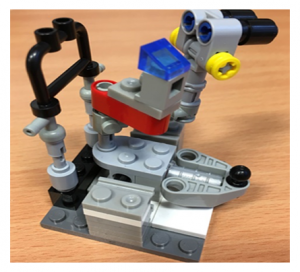 “A couple of academics from Salford University ran a Crystal Maze-style session where one of the challenges was to build something out of Lego. I thought this is brilliant. I started thinking about how I could do this in my teaching,” Mr Gridley told OT.
“A couple of academics from Salford University ran a Crystal Maze-style session where one of the challenges was to build something out of Lego. I thought this is brilliant. I started thinking about how I could do this in my teaching,” Mr Gridley told OT.
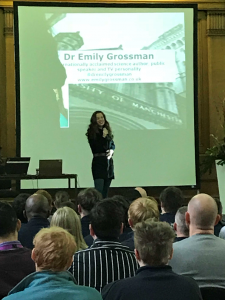 Nearly 200 technical staff gathered together on Tuesday 12th December to celebrate TEaM (Technical Excellence at Manchester). Created by technical staff, for technical staff, the group aims to raise their profile across campus, ensure their contributions to the University are recognised, and empower them to develop their careers.
Nearly 200 technical staff gathered together on Tuesday 12th December to celebrate TEaM (Technical Excellence at Manchester). Created by technical staff, for technical staff, the group aims to raise their profile across campus, ensure their contributions to the University are recognised, and empower them to develop their careers.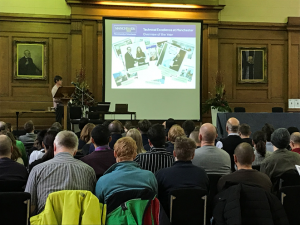
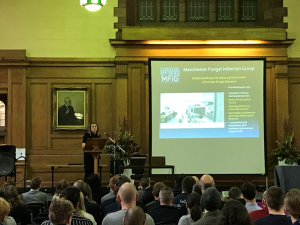
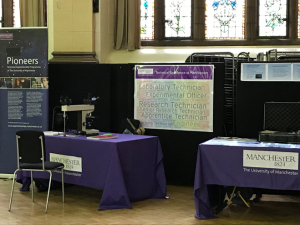
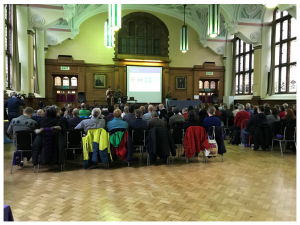
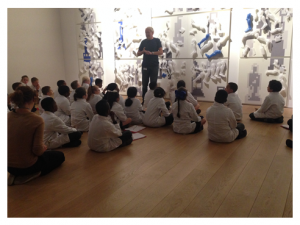
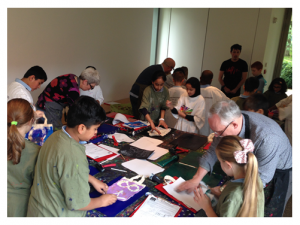
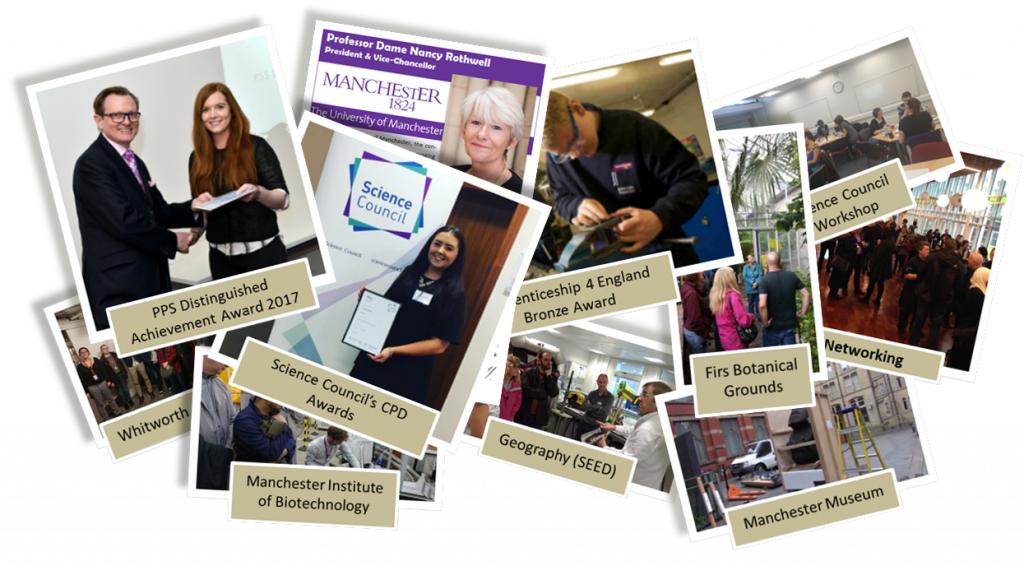
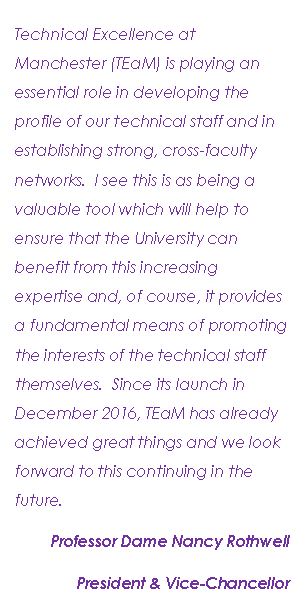 In the Autumn, Nancy Rothwell, the University President & Vice-Chancellor, issued a supporting statement for TEaM which demonstrated that TEaM is wholly recognised by senior University management. It acknowledges the contribution we make, as technical staff, to research and teaching, and recognises our contribution to meeting the growing needs of the University in looking forward.
In the Autumn, Nancy Rothwell, the University President & Vice-Chancellor, issued a supporting statement for TEaM which demonstrated that TEaM is wholly recognised by senior University management. It acknowledges the contribution we make, as technical staff, to research and teaching, and recognises our contribution to meeting the growing needs of the University in looking forward.
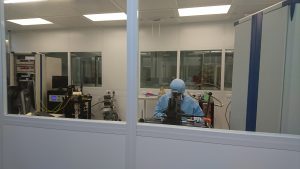 Groups of technicians were guided on our tour of the five storey facility by John Whittaker, Head of Operations for the NGI.
Groups of technicians were guided on our tour of the five storey facility by John Whittaker, Head of Operations for the NGI.